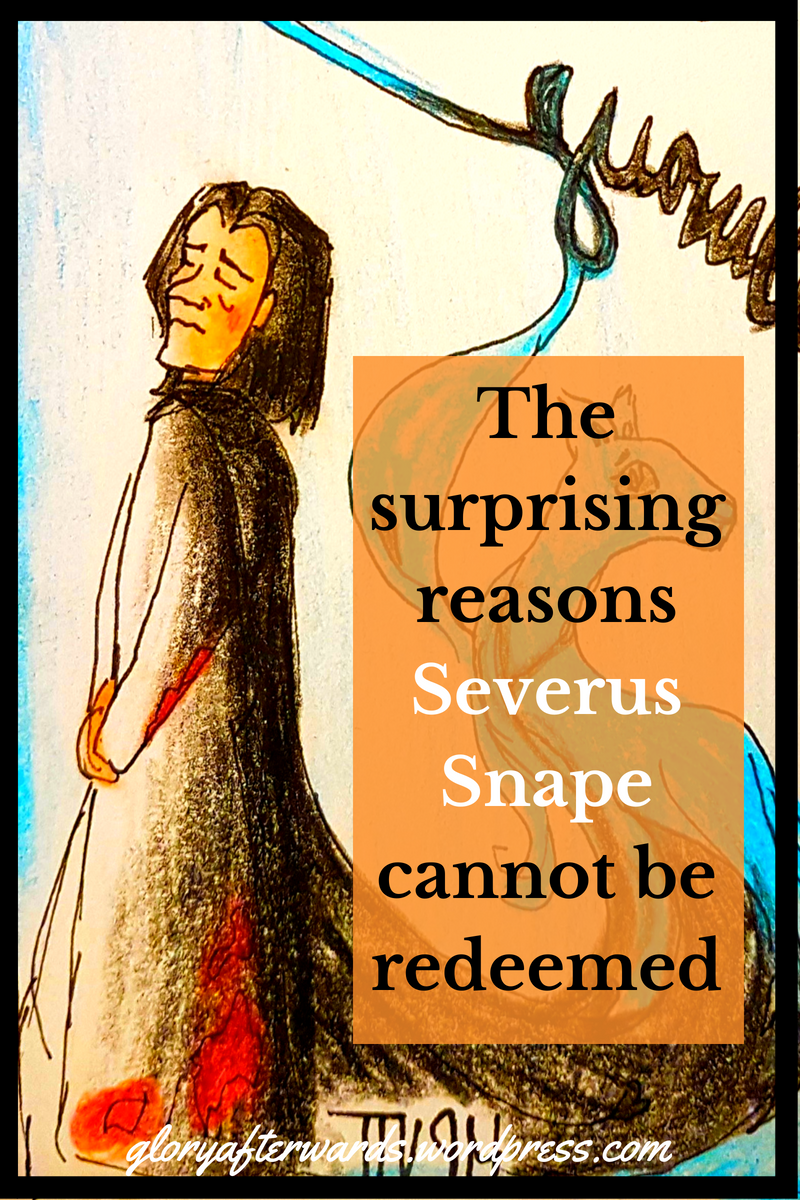I love amateur literary analysis. Love reading it, love writing it. Here’s some pondering on a very well known character of an extraordinarily well known series.
Severus Snape is a complicated character
Severus Snape, of Harry Potter fame, has gained many followers.
I understand why.
He’s a complicated character and there’s much to explore and much subtext to read. He joined the Dark side in his youth, returned to the Light after he realised the love of his life (married to someone else) was in danger. After her death he swore to protect her only son, who was the spitting image of his childhood nemesis. He worked as a double, triple agent, ultimately on the Light side, yet spending much of his time working with the Dark. He was anti-social, unpleasant and held tightly to the grudges of his youth, killed the ‘greatest wizard of all time’ and the only one who knew his secret, yet died himself before he could see his side win.
He was the only character who didn’t receive his just deserts. He didn’t receive acknowledgement for the work he did. Many characters died, but he was the only one who perished without everyone knowing who and what he died for.
What if Snape’s story had been different?
There’s much that’s tragic and seemingly unsatisfactory about his story, and this has captured the minds (and hearts?) of Harry Potter fans since the release of the final book. Thousands of writers have explored him through ‘fan fiction’ and many attempts to ‘fix’ his rather dismal character-arc have been made. Most attempts at ‘redeeming’ Severus Snape have centred on the “just turn left” premise: are some parts of our lives cross-roads, and if we turn left instead of right, can a crisis be adverted? Could Severus Snape have been happy had just one factor of his life been different?
If Harry had known the truth earlier, could Snape have been redeemed?
One of the strongest ‘left turns’ is this: If Harry had known that Snape loved his mother before Snape’s death, would Snape’s story have received a happy ending?
No – Snape would have become the protagonist
Firstly, if this alternate plot was to become canon the entire Harry Potter series would be derailed and dismantled. If Harry were to discover Snape’s motives earlier, Snape would by necessity overtake Harry as the protagonist. This is simply because knowledge of Snape’s history would force him to become the most fascinating character. His motives for acting would be stronger than Harry’s – not because his love for Lilly his necessarily stronger than Harry’s for his friends and his world, but because it is an older love. It has the ‘first stake’, so to say, in the reader’s mind, and it affects all the other character arcs including Harry’s own.
No – the wider narrative would be damaged
Not only so, but Snape’s relationship with Harry Potter would have pushed aside the development of all other relationships. It would by necessity be the most fraught with conflict. As a result almost every relationship would be changed, depending on what the character believed about Snape and how this affected their relationship with him, and Harry. The entire focus of the series would change, the narrative as we know it, dissemble, and the other characters would not get the chance to gain limelight for their own stories. Harry Potter as a series works so well because the protagonist is invested more in other characters than in himself. Revealing Snape’s motives would change this.
No – the major themes would be altered
As a result the major theme would become one of lost love, childhood misunderstandings, and the journey to repair a relationship, rather than the coming of age story of a child who embraces love and heroism for the greater good. Would this have resulted in Snape’s eventual happiness? In the end, it doesn’t matter, because as protagonist he would be such a different person and fulfil such a different role, that it would be a moot point. This premise would change the storyline to such an extent that it would not be a ‘turn left’ but rather a ‘re-write’. Titles such as ‘Harry Potter and the Philosopher’s Stone’ we be replaced by ‘Severus Snape and the first appearance of the Brat-with-Lily’s-eyes.’
If everyone had known Snape’s true loyalties, could he have been redeemed?
Another ‘turn left’ premise is this: what if Harry hadn’t understood Snape’s true motives, but the rest of the teachers had?
No – there is already knowledge of his true loyalties
This notion suggests that Snape’s character arc would have been a happier one because he would be able to receive (covert) solace and recognition from others for his difficult work. This idea fails to recognise that in actual fact all the adults at Hogwarts knew that he used to be a Death-eater, had apparently defected of his own volition, been forgiven, and re-created himself as a Potion teacher. If that’s not enough for admiration, what is? Very few Death-eaters seem to have had the courage or the moral strength to change sides. Yet Severus Snape appears to receive very few claps on the back for his visible heroisms – and that has nothing to do with societal blinkers, but with himself.
No – Snape chose not to receive thanks
Severus Snape’s life is thankless one, not because no one cares, but because he refuses to permit gratitude. He refused to let Dumbledore reveal the reason he defected and he actively built up a fearsome and prickly reputation. There is no evidence that he seeks friendships with the other Professors – indeed he seems to triumph in besting them. He does not seem to cultivate relationships beyond what’s necessary, not even with Dumbledore, the only man who knows the truth. There is evidence for him to be respected as a hero yet he snuffs out all attempts with his behaviour towards others.
No – Snape does actually receive acknowledgement
Secondly, it cannot be forgotten that one person does indeed know of the depths of his sufferings and heroism. Dumbledore, who, by all accounts is both extraordinarily powerful and also not un-feeling towards Snape’s plight, knows the best and worst of him. Snape does receive some acknowledgement – one person knows the truth. The result of this is that Snape is asked both to murder Dumbledore and protect Hogwarts with his life. An awful calling, but one that is in one sense a reward: outcast Snape is trusted completely and comprehensively with the future of the wizarding world. While Snape rejects any acknowledgement of his bravery by his peers, he accepts this task as his own, cementing the belief that outward praise would have not made his happiness complete.

If Snape had lived beyond Voldemort’s demise, could he have been redeemed?
A last ‘turn left’ idea is the one that Snape would have been happy had he lived to see Voldemort’s demise and been able to actively partake in the post-war world.
No – merely living would not have brought Snape happiness
While it would be nice to fondly imagine an aging potions master pottering about his chambers and dreaming of Lily, I do not think such a scenario would be a redemption in the eyes of canon-Snape. Even ignoring the demands of the Elder wand which apparently ensured Snape’s death, it is suggested that living on would not have brought happiness to Snape.
No – there would be no way for him to express his love for Lily
The reason the potion master struggled through years of teaching, conflict and double-agent life, was not because he sought a peaceful retirement, or even a Voldemort-free society. He did it all for Lily. It is the reason he stayed alive: to save Harry Potter for Lily and to fight for Lily’s side in her place, and there is no evidence in the slightest that along the way he found something else to focus his life upon. Quite the contrary, if his ‘always’ means anything in this regard. A safe, happy existence would have given Snape no way to express his love for Lily, and no doubt would have irked him no end.
Snape has already been redeemed
I enjoy the idea of exploring the ‘might have beens’ and ‘what ifs’, but I think it is important to acknowledge that J. K. Rowling wrote a watertight narrative in regards to Severus Snape. We can change canon completely, but we cannot simply tweak one section, or turn left instead of right in order to bring a tragic character happiness. The ultimate reason for this is not listed above. Rather, it’s the reality that J. K. Rowling has already redeemed Snape in the current narrative.
Snape was redeemed by Harry Potter. If Voldemort had murdered the one-year-old along with his parents, Snape would have no reason to live. He would have died a traitor and a coward.
Yet because Harry Potter was The Boy Who Lived, Severus Snape became The Death-Eater Who Loved. He was handed a reason to live, and live he did. Bravely, cleverly, showcasing his immense talents, living life on the edge and to the full range of his powers, Snape redeemed himself for sixteen years. He was provided with a second chance to prove himself, to live in a ‘normal’ community, to be respected and liked and appreciated. He was able to indulge in dramatics and hone his skills. Ultimately he was able to sacrifice, redeeming his past mistakes once and for all, and leaving a (rightly) treasured legacy. He lives on in the name of Harry’s son Albus Severus in a way he never would, had Lily never died and Harry never lived.
The reason we want to redeem him further
It’s natural and in a way right, to want to redeem Snape further. We want to see messed up people get happy endings because we are all messed up. We want to prove that rude, selfish people can be admired and loved, because we’re all rude and selfish. We want to believe that past mistakes can still lead to earthly happiness, because we all have past mistakes. Unfortunately, the reality is that more often than not, these are not true statements. Tragically, people who are abused abuse others. People who make terrible mistakes live ruined lives. People who live for themselves are left by themselves.
Yet this, by the grace of God, is not uniformly the case. J. K. Rowling gives us hope through other characters. Harry, who was neglected but did not neglect others. Ron who made a huge mistake, but did not ruin his life, and Percy, who lived for himself, but was not left by himself.
Snape, tragic hero as he is, shows us what is often the case, while the other characters show us what can be. We need both the warning and the encouragement, but all to often we only have eyes for the latter, and so we try and try to redeem Severus Snape ourselves.
// What do you think? Agree/disagree?











[…] The problem with redeeming Severus Snape […]
[…] Severus Snape – Harry Potter (book series) […]
[…] Harry Potter. […]
[…] all know the fictional ‘trope’ of “self-sacrifice.” It’s what Aslan, Harry Potter, Timothy and Jesus have in […]
[…] all know the fictional ‘trope’ of “self-sacrifice.” It’s what Aslan, Harry Potter, Timothy and Jesus have in […]